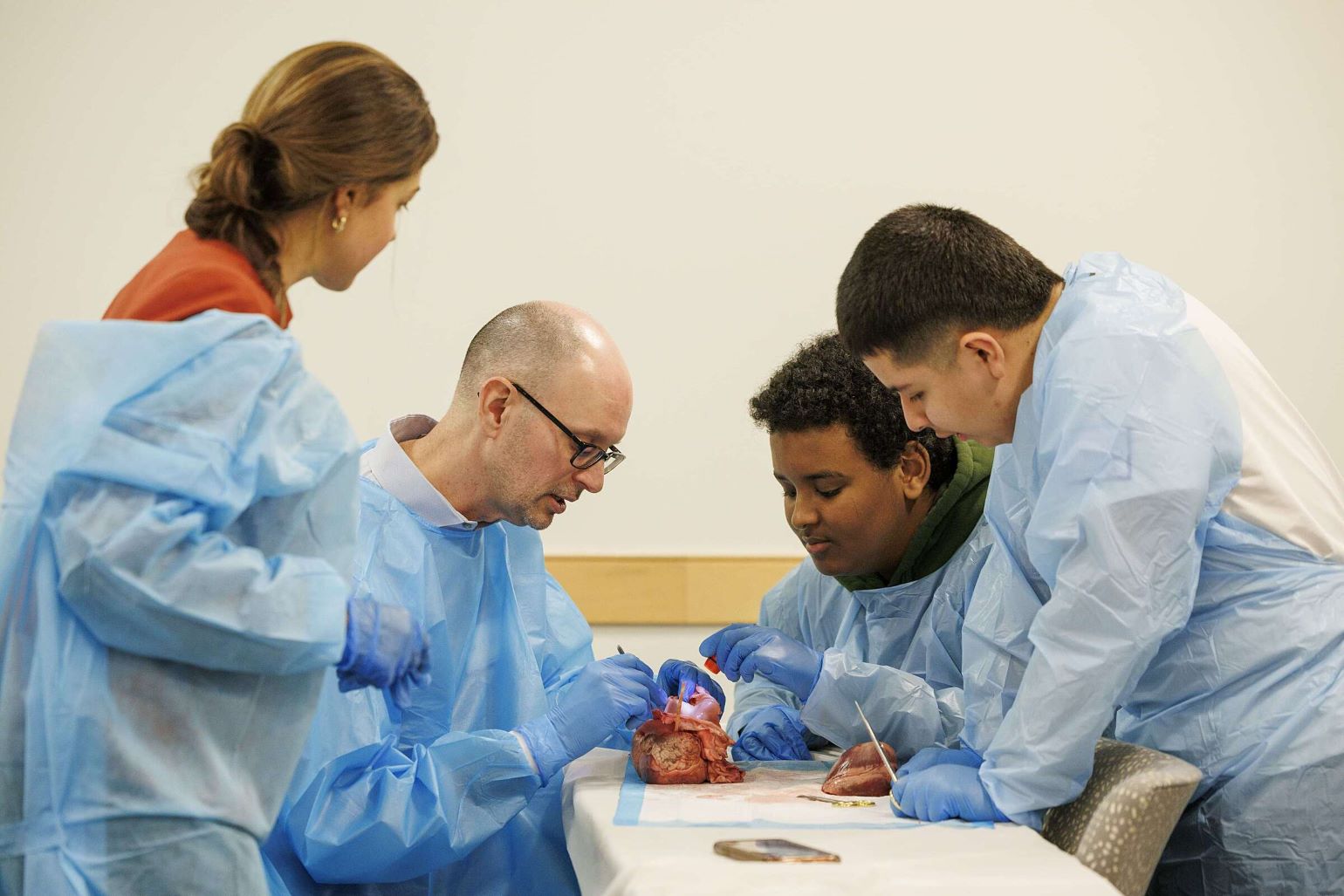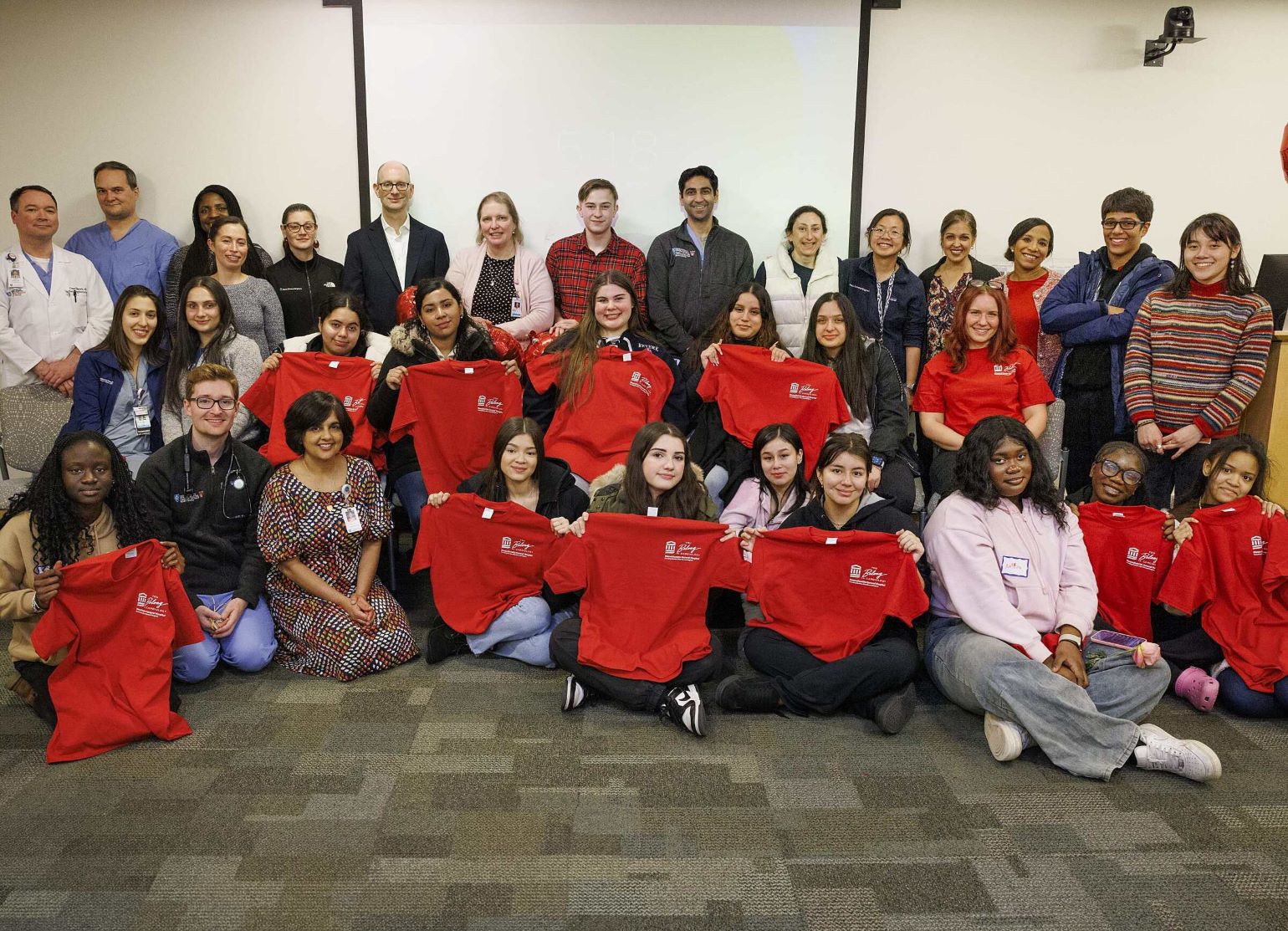New Program Helps High School Students Explore Careers in Cardiology
In This Article
- There is a well-known scarcity of women and underrepresented minorities in cardiology professions
- Increasing diversity in cardiology can improve disparities among underrepresented patient groups
- A new Massachusetts General Hospital program is engaging high school students to introduce them to various aspects of cardiology
- The program exposes high schoolers to CPR, cardiac anatomy, imaging, clinical care in cardiology and allied health roles, and mentorship opportunities
Massachusetts General Hospital has launched a new mentorship and career exploration program to inspire diverse students to consider careers in heart health. You Belong in Cardiology aims to introduce minority high school students to cardiology and allied fields.
Subscribe to the latest updates from Cardiovascular Advances in Motion
"Numerous studies confirm the crucial role of diversity in the healthcare workforce. Diversity improves access to care, minimizes health disparities, and enhances overall care quality, especially for underserved patient groups," says cardiovascular disease fellow and program co-founder Giselle Alexandra Suero Abreu, MD, PhD, MSc. "Factors like patient-physician concordance have also been linked to better control of cardiovascular disease risk factors and health outcomes."
The You Belong in Cardiology Program aims to inspire students, cultivate an interest in cardiology, foster long-term mentorship relationships, and develop the pipeline of future cardiologists and allied professionals in cardiology from diverse backgrounds.

Figure 1
Demonstration of heart dissections.
Increasing Diversity in Medicine and Cardiology
Women and minorities have disproportionately high rates of cardiovascular disease and experience worse outcomes. Numerous studies have shown, however, that minority patients achieve better outcomes when their doctors look like them.
"There are tremendous cardiovascular disparities in the local communities around us and beyond," says Doreen DeFaria Yeh, MD, director of the Mass General Cardiovascular Disease Fellowship Program. Dr. DeFaria is assisting Dr. Suero Abreu on the You Belong in Cardiology Program.
"It's known that if providers look like the patients they're serving, patients trust them and are often more engaged in their care. Underrepresented people in healthcare professions may also better understand some of the socioeconomic challenges certain groups and communities may have that are unique to them. So it's critically important that we diversify the cardiovascular workforce," Dr. DeFaria adds.
Unfortunately, that workforce is not representative of the communities it serves. Women represent only a small number of cardiology fellows:
- 24% general cardiology
- 14.5% interventional cardiology
- 11% cardiac electrophysiology
Underrepresented minority physicians are also rare in cardiology fellowships:
- 9.9% general cardiology
- 8.9% interventional cardiology
- 7.4% clinical cardiac electrophysiology
- 10.2% advanced heart failure and heart transplantation
This trend continues into the workforce, where only 13% of practicing cardiologists are women and 7.5% are minorities.
Strengthening the Cardiology Pipeline
Dr. DeFaria says the lack of a diverse pipeline in cardiology is a two-part problem: Not enough minorities pursue cardiology, and the pipeline is "leaky."
"Training for cardiology is very long. We lose people along the way. Some lose interest, some are unable to pursue next steps, from high school to college, college to medical school, medical school to residency, residency to fellowship," she says. "We want to start early, inspiring some young students, and hopefully, we can show them they can succeed in this field."
Dr. Suero Abreu believes You Belong in Cardiology is part of a short- and long-term effort that must include education and advocacy by cardiology professional societies, legislation, and research. She was inspired by a program called I Look Like a Cardiologist, founded at the University of Pittsburgh in 2019 by Kathryn Berlacher, MD, one of her career mentors.

Figure 2
You Belong in Cardiology Program group photo.
Early Introduction to Careers in Cardiology
You Belong in Cardiology, funded by a Mass General Cardiology Fellowship Pilot Award, invites students who self-identify as female, a racial or ethnic minority, from a disadvantaged socioeconomic background, LGBTQIA+, or potential first-generation college students. The program welcomed its first cohort of 30 students in January 2024.
This inaugural year, You Belong in Cardiology had four sessions for 10th graders. The students worked directly with cardiologists, fellows, and other allied professionals such as nurse practitioners, nurses and technicians from our cardiac catheterization laboratory, cardiac imaging departments (CT, MRI, and nuclear cardiology) from diverse backgrounds to:
- Learn cardiopulmonary resuscitation (CPR) in collaboration with the American Heart Association and be encouraged to be CPR champions in their communities
- Dissect pig hearts donated by Zoll to learn about heart anatomy
- Learn about cardiology careers, including medicine, nursing, athletic training, imaging, and other allied health pathways
- Simulate echocardiography and ultrasound
- Tour clinical facilities, including areas such as the catheterization lab
"We hope to expose several cohorts of students annually, and over time we will aspire to see some of them choosing careers in cardiology. We would also love to hear stories from students who used some of their new skills, such as hands-on CPR, and maybe help save a life!" Dr. Suero Abreu says.
Building on Mass General's Commitment to a Culture of Diversity
You Belong in Cardiology builds on the foundation of the MGH Youth Scholars Program, which aims to increase student interest and success in science, college, and healthcare fields. The program also partners with the Mass General Center for Diversity and Inclusion and the Center for Community Health Improvement.
"Mass General has long-standing initiatives that show a real commitment to a culture of diversity and inclusion across the institution. There is a willingness to change the reality of our workforce through tangible actions," Dr. Suero Abreu says. "This supportive environment is very fertile ground for the You Belong in Cardiology Program to flourish."
Through the MGH Youth Scholars Program, You Belong in Cardiology hopes to continue to follow up with student participants and help connect them to future mentorship opportunities. Some faculty members will volunteer to remain available to students who want continued mentorship.
"This program is already successful, given the support of our cardiology leadership and the Center for Diversity and Inclusion, as well as our partnerships with the MGH Youth Scholars, the American Heart Association, and Zoll. In particular, we have had a lot of enthusiasm from all our volunteers in the cardiology community at Mass General," Dr. Suero Abreu says.
Learn more about the You Belong in Cardiology Program
Refer a patient to the Heart Center